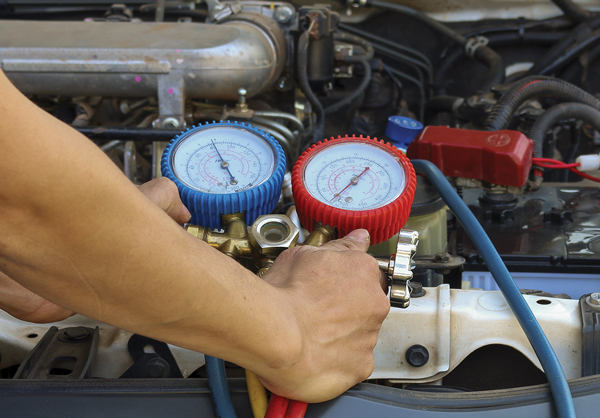BY DAVID HARTSON
 Summer is here, and there is perhaps nothing more important to your clients’ comfort than that miraculous invention we take for granted: air conditioning. During these dog days, particularly in the southern U.S. states, the AC is as critical to a successful ride as the vehicle’s wheels. No one wants to have their passenger show up at a business meeting looking like they just came from a swim. Simply put, a broken AC could lead to an irreparably broken business partnership.
Summer is here, and there is perhaps nothing more important to your clients’ comfort than that miraculous invention we take for granted: air conditioning. During these dog days, particularly in the southern U.S. states, the AC is as critical to a successful ride as the vehicle’s wheels. No one wants to have their passenger show up at a business meeting looking like they just came from a swim. Simply put, a broken AC could lead to an irreparably broken business partnership.
Since virtually all AC systems work in the same manner, it’s easy to share some basic tips to keep your air flowing and repair costs down—especially when you realize it just takes a little driver education and some preventive maintenance.
In many cases, the primary necessity in keeping an AC system fully functional is a basic knowledge of how it works, beyond just turning on a switch. Someone who simply relies on their car to run errands or for a daily commute may not need an in-depth education on the AC system, but that’s far from the case in the chauffeured transportation industry. Your chauffeurs need to know the basics of how the system works, as well as its care and management.
For instance, your AC’s best performance comes when the vehicle is moving down the highway. This creates air flow that blows across the condenser, which is usually located in the front of the vehicle, close to the radiator. When a chauffeur complains that the AC system blows hot air after the vehicle has been sitting for an hour or two in front of a hotel, it’s because there’s been no airflow coming into the system, which causes the refrigerant contained within to expand and eventually turn to liquid.
An idling vehicle with its AC cranked not only excessively burns fuel but also can damage the AC system. It’s generally a good idea to turn the vehicle off if you’re planning to sit for a long period of time; however, this isn’t particularly realistic during the summer months. Your AC will function much better if you keep the car moving to maintain the air flow needed for the system to work optimally. While driving around the block might be an inconvenience for the chauffeur, it’s the best option to ward off a potentially costly AC repair in the future.
If the AC system is not blowing cool air and you need the system to perform, the simple trick of taking a garden hose to the front grille and spraying in it for five minutes may help. Or, if there is an automated drive-through carwash in the area, get the car washed. The water will cool down both the vehicle and the AC system until you’ve driven enough for the vehicle to retain its air flow.
“In many cases, the primary necessity in keeping an AC system fully functional is a basic knowledge of how it works, beyond just turning on a switch.”
Since most people don’t run their ACs during the winter, the refrigerant can sometimes leak from the system during seasons of non-use. Keep in mind that running your defroster to dry out the windshield in the winter does activate the AC system: By doing this, the AC system keeps operating, which can prevent leaks at seals in the system.
 An important part of prevention—and peace of mind—is also having a trustworthy mechanic who is knowledgeable about the AC system but also has the right parts and equipment to repair it when things go south. Every year, once spring has sprung, get your AC system ready by having that thoroughly vetted mechanic look at the system pressure to ensure there is enough refrigerant to make it work. Next, have them examine the condenser to see if it’s dirty. During the winter, the mixing of dust and water can result in mud caked onto the vehicle’s condenser and radiator: A shop can clean the condenser and remove the dirt for better efficiency. But if the condenser is in need of more intensive repair or replacement, you can save money in the long run by taking care of it before the whole system comes apart. This annual springtime trip to the garage is money well spent.
An important part of prevention—and peace of mind—is also having a trustworthy mechanic who is knowledgeable about the AC system but also has the right parts and equipment to repair it when things go south. Every year, once spring has sprung, get your AC system ready by having that thoroughly vetted mechanic look at the system pressure to ensure there is enough refrigerant to make it work. Next, have them examine the condenser to see if it’s dirty. During the winter, the mixing of dust and water can result in mud caked onto the vehicle’s condenser and radiator: A shop can clean the condenser and remove the dirt for better efficiency. But if the condenser is in need of more intensive repair or replacement, you can save money in the long run by taking care of it before the whole system comes apart. This annual springtime trip to the garage is money well spent.
During the summer, your vehicle might be on time and the chauffeur might be perfect, but if the AC isn’t working well, then at best you’re inevitably dealing with an unhappy client—at worst, you’re giving them a free ride. A little staff education and preventative maintenance may keep issues from heating up while saving you some cold, hard cash. [CD0717]
David Hartson is a longtime industry consultant, partner at non-emergency medical transportation company Procare Solutions, and the West Coast editor for Chauffeur Driven. He can be reached at david@chauffeurdriven.com.

